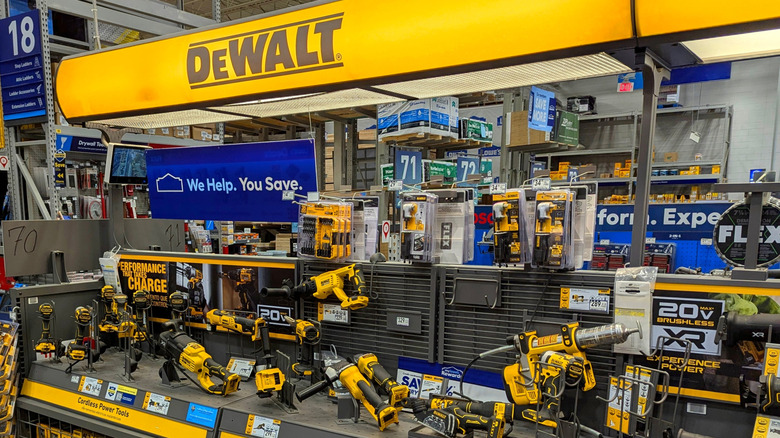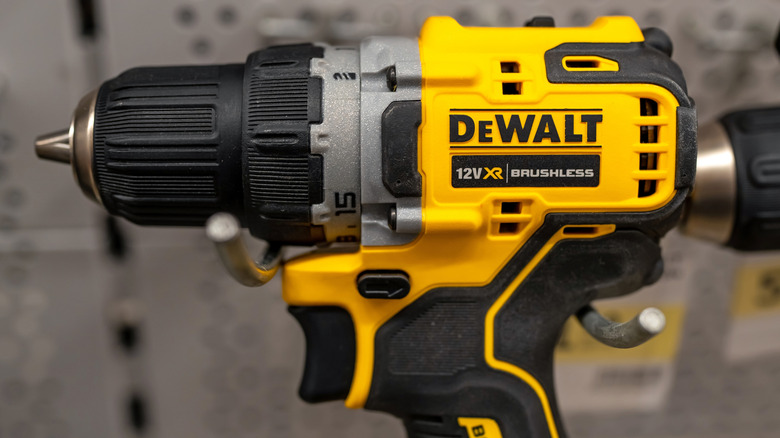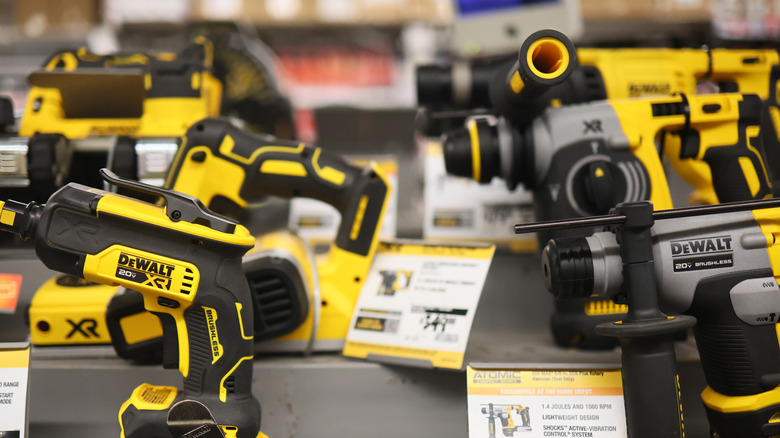How To Decide If DeWalt Power Tools Are Worth Buying For Your Collection
When you're thinking about purchasing power tools, you're most likely looking for traits like quality, durability, and user-friendliness. So, if you want the most popular power tool brand in the United States while also ensuring dependability, DeWalt seems to be the number one choice. DeWalt's power tools are suitable for both homeowners who love to DIY and professionals. The company stands behind its reputation for reliability by offering a limited lifetime warranty on some of its products, while the majority of its tools come with a three-year limited warranty. The brand also offers a three-year limited warranty on its batteries, including a 90-day satisfaction guarantee.
However, if you're primarily worried about price, you might wonder whether it's worth buying DeWalt power tools. These tools are more expensive than cheaper brands like Ryobi, and they tend to cost only a little less than other high-end brands like Milwaukee. Therefore, determining whether high-end DeWalt tools are worth splurging on can be a challenge.
If you're wondering whether you should invest in DeWalt tools, start by considering whether you'll use them regularly, meaning you need the excellent build quality that this manufacturer provides, even though you'll spend a little more. People who rarely use their tools and only for an occasional DIY project, may not need the quality and reliability found with DeWalt, allowing them to save money with a cheaper brand, like Ryobi. But, if you're new to the cordless tool game or you're ready to switch brand loyalties, you'll want to know whether DeWalt products are worth the investment.
Advantages that make DeWalt power tools worth buying
One of the most favorable aspects of DeWalt power tools is that they're frequently made in the United States. Such tools will have a "Made in the USA" label on them. When DeWalt says its tools are made in the United States, understand that they may consist of parts manufactured elsewhere in the world and shipped to the United States for final assembly. Most of them are designed and engineered at the company's headquarters in Maryland.
Because so many professional contractors rely on DeWalt, you can trust the manufacturer to offer dozens of different kinds of tools throughout its cordless platform. Whether you need common tools or lesser-known DeWalt tools, you can easily find them when you choose to invest in this manufacturer's extensive line of products. For example, DeWalt offers several plumbing power tools, like handheld tubing cutters, and even if your favorite bargain brand offers these products, they probably won't have as many options.
For those who want versatility in their battery technology, DeWalt offers Flexvolt, which automatically changes voltage to match the tool you're using. You can use Flexvolt batteries with both 20 and 60-volt DeWalt tools. If you own 20V DeWalt products, the Flexvolt battery is backward compatible with them, enhancing your run time. If you slide the Flexvolt battery into a 60V DeWalt tool, it delivers the significant power you expect. The change in voltage happens automatically, meaning you can just use the tools without worrying about flipping a switch to change voltages.
Reasons you might want to skip adding DeWalt tools
For DIYers who are only interested in 12-volt cordless power tools, DeWalt offers the 12V MAX system, but it only has a limited number of products available. If you buy 12V tools and batteries, understand that they are not compatible with DeWalt's 20V and larger tools, meaning you'd have to start over with your investment if you want to migrate to 20V products. Additionally, rumors exist about whether DeWalt will continue to innovate and support its 12-volt line of tools. So, if you only want 12-volt units, you may want to look elsewhere.
A major consideration about migrating to DeWalt is your existing investment in power tools. Batteries are not sharable between brands like Ryobi and DeWalt, as both manufacturers have proprietary cordless power systems. This means that once you select a brand and invest some money in it, starting over with DeWalt can be an expensive proposition. You'd not only have to buy new tools, but you'd need new batteries and chargers, too.
However, if the cordless tools you currently own have batteries that are starting to fail, you might want to migrate to a new brand and battery system, instead of buying new batteries for existing tools that you may not like all that much. Power tool batteries normally last for 300 to 500 charging cycles, so if your current batteries are near the end of their lifespan, switching to DeWalt might be worth considering. On the plus side, DeWalt batteries are known for handling tough conditions and delivering longevity.


